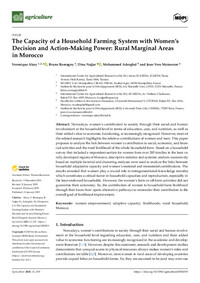The Capacity of a Household Farming System with Women’s Decision and Action-Making Power: Rural Marginal Areas in Morocco

Authors:
Nowadays, women’s contribution to society through their social and human involvement at the household level in terms of education, care, and nutrition, as well as their added value to economic functioning, is increasingly recognized. However, most of the related research highlights the relative contributions of women and men. This paper proposes to analyze the link between women’s contribution to social, economic, and financial activities and the rural livelihood of the whole household farm. Based on a household survey that included a respondent section for women from over 285 families in the least rurally developed regions of Morocco, descriptive statistics and systemic analysis successively based on multiple factorial and clustering analyses were used to analyze the links between household adaptative capacity and women’s material and immaterial contributions. The results revealed that women play a crucial role in intergenerational knowledge transfer, which constitutes a critical factor in household capacities and reproduction, especially in the least endowed households. However, the women’s farm or off-farm activities did not guarantee their autonomy. So, the contribution of women to household farm livelihood through their know-how opens alternative pathways to reconsider their contribution to the overall goal of livelihood improvement
